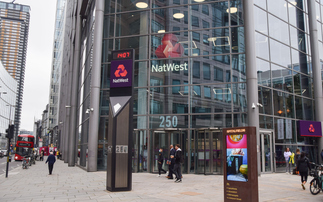Lauren Compere sets out the steps banks must take to protect clients from climate change risks
The COP21 conference in Paris is a little over a month away, and the build-up to a new international climate agreement has seen 55 countries specify the amount of funding they require to deliver the mitigation and adaptation projects needed to keep global warming below 2°C.
This totals $4.8tr, more than the entire GDP of Japan or Germany, and represents a huge new opportunity for the private sector to support society's transition to a low carbon economy. Especially for banks, who can finance, underwrite and invest in lucrative growth markets from energy efficiency to water and waste.
Despite the scale of the opportunity, our year-long research project - supported by a $500bn group of 80 institutional investors - identified that most banks are so far failing to take their share of this historic dividend.
New research reveals some leading lights
Led by Boston Common, the investor research analysed climate-related processes and practices at 61 of the world's largest banks, and found that none seem to be taking a strategic approach to managing climate risk and realising the post-COP21 opportunities.
For example, a large majority of banks do not disclose how they define "clean tech" or "clean energy," or set quantitative targets for increased financing of these projects. This limited corporate disclosure means that investors are unable to determine to what degree a bank is investing in sustainable solutions.
Notable exceptions on disclosure practices included Dutch bank ING Group and DNB in Norway, who reported that they direct 39 and 36 per cent of their energy portfolios respectively, toward renewable energy. US giant Wells Fargo also disclosed that renewable energy projects owned in whole or in part by the bank produced 11 per cent of US solar photovoltaic and wind energy generation in 2013.
Grabbing opportunities
Australia and New Zealand Bank showed a positive approach to grasping opportunities. They set a target to increase its lending to gas and renewable power generation by 15-20 per cent between 2011 and 2020. In the US, Bank of America and Citigroup both showcased best practice. Bank of America made a 2007 commitment to finance $20bn of new climate mitigation, adaptation and energy efficient technologies, while Citigroup has successfully directed $54bn towards climate change related opportunities.
These best practices case studies are encouraging, but the disconnect between the scale of these isolated examples and the management of climate risk and opportunity as a whole is stark.
Little regard for risk management
Banks are tied to every market sector through their lending practices, making them uniquely vulnerable to climate-related risks such as increased incidences of floods and droughts. And after the market turbulence of the past decade, investors might assume that they are taking the risks resulting from exposure to the negative effects of climate change, a little more seriously.
Yet the answers to questions such as whether banks assess the carbon risk of their lending and underwriting, conduct climate-related stress tests or measure carbon footprints - were often underwhelming.
For example the vast majority of banks do not perform climate related stress tests that would define its exposure to natural disaster risk (as the insurance industry does on a routine basis). Only one bank - Bank of Nova Scotia - clearly disclosed that it integrates climate-related risks into loan pricing.
No bank is currently measuring its carbon footprint
Perhaps the most surprising of our findings was that no bank is currently measuring its carbon footprint. This comes at a time when the ‘Montreal Pledge', which commits institutional investors including Boston Common Asset Management to measure and publicly disclose the carbon footprint of their portfolios, has now reached over 100 investors managing over £8tr in assets.
More encouragingly, however, several banks reported that they are considering carbon footprint analysis in some way and a few, such as JPMorgan Chase, now participate in industry initiatives such as The Portfolio Carbon Initiative, which is developing climate performance metrics for the banking sector.
Others, including HSBC and UBS, have established board-level oversight of environmental policies and performance, but only a handful specify climate as a board-level responsibility. Only one company, Australia and New Zealand Bank, specifically highlighted direct consideration of climate goals in the compensation process.
A finite time to act
As the Governor of the Bank of England said earlier this month there is still time to act on climate change, but the window of opportunity is finite and shrinking.
If banks are going to capitalise on the huge market opportunity that a shift to a low carbon economy will bring, at the same time as protecting their clients and customers from the potential drastic effects of climate related risks, then we need them to act now.
Our new report has established four key steps that banks need to take to improve their strategic management of climate-risk. They are:
1. Establishing long-term, comprehensive climate strategies with board- level oversight and links to compensation;
2. Reporting on total carbon footprint of their financing activities, with development of reduction targets to carbon intensive sectors.
3. Reporting quantitative figures and targets for supporting energy efficiency and renewable energy; and
4. Conducting regular environmental stress tests.
Banks that respond to this challenge will be best placed to harvest the multi-trillion opportunity that the low-carbon transition will bring.
Lauren Compere is Managing Director at Boston Common Asset Management








